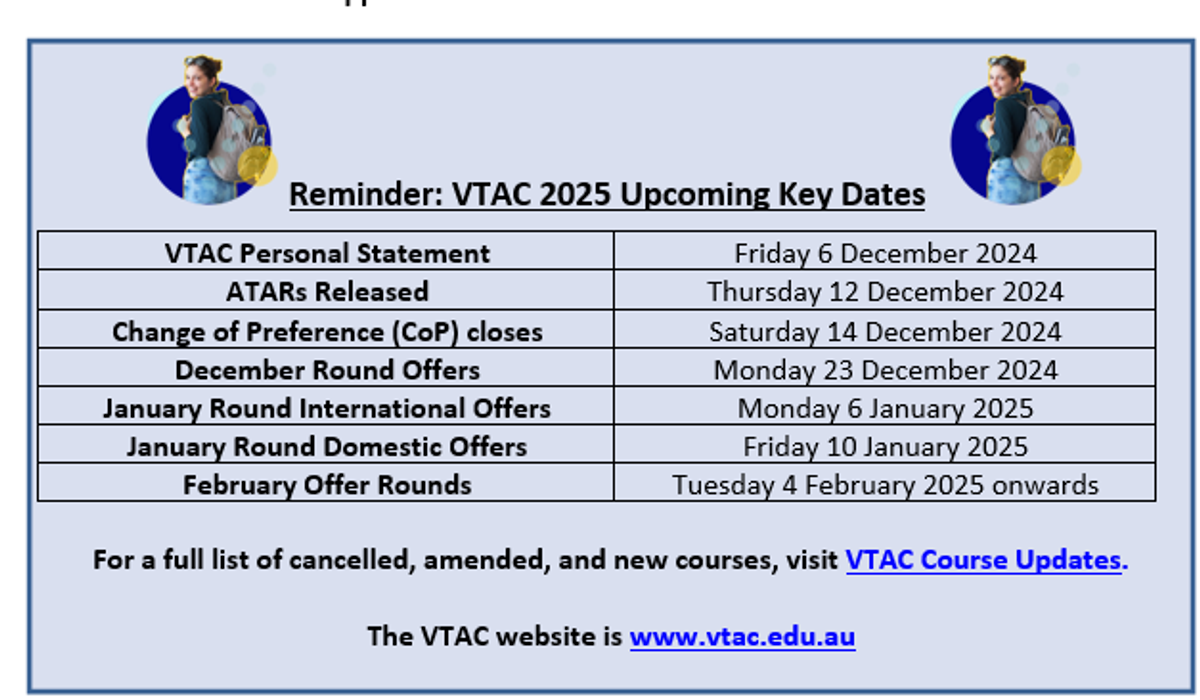Careers

CAREER NEWS Friday 1 November
Dates to Diarise in Term 4
- Year 12 VTAC late applications – 1 October to 1 November
C.A.S. Hawker Scholarship
C.A.S. Hawker Scholarships are one of the most generous privately funded scholarships available to undergraduate students in Australia. Each residential scholarship is valued at up to $60,000 over three years. The scholarships are available to all Australian students, and the majority are usually awarded to students entering their first year of university studies.
Selection is largely based on personal qualities and demonstrated leadership as well as academic ability. Undergraduate Hawker Scholars are able to attend a range of Australian educational institutions, so this scholarship is not restricted to one university.
The Charles Hawker Scholarship perpetuates the memory of scholar, soldier and pastoralist Charles Allan Seymour Hawker and commemorates the achievements of one of Australia’s most respected statesmen.
The 2025 C.A.S. Hawker Scholarships will open on Monday 18 November 2024 and close on Monday 6 January 2025.
Current Year 12 students are encouraged to browse Hawker Scholarship for more information about the scholarship, and to download an application form.
Pathway to Physiotherapy
Monash University recently introduced the new Doctor of Physiotherapy, a three-year graduate-entry degree based at the Peninsula campus. This offers students with a passion for physiotherapy another pathway to a qualification, if unsuccessful in their application to the Bachelor of Physiotherapy (Honours). A Monash Bachelor of Biomedical Science, Science, or Health Sciences degree is a great foundation for the Doctor of Physiotherapy. Students must meet specific unit requirements.
Find out more at Doctor of Physiotherapy.
News from Victoria University
- Studying Osteopathy at VU
Osteopaths diagnose, treat and provide preventative advice about disorders that affect the body's musculoskeletal system, using manual techniques to alleviate stresses and dysfunction to improve the body's function (Good Universities Guide - Osteopath)
VU offers one of only three of these accredited programs in Australia. Core studies include anatomy, osteopathic science, physiology, and biochemistry. Students undertake fieldwork and clinical practice to prepare them for their osteopathy career. Students considering a career in osteopathy need to complete the Bachelor of Science (Osteopathy) first; this is a 3-year course and provides an entry into an osteopathy career. Completion of the Bachelor of Science (Osteopathy) course alone does not make graduates eligible for registration as Osteopaths. Students must also complete the Master of Health Science (Osteopathy) in order to be eligible to register as an Osteopath. So, the double degree program is:
- Bachelor of Science (Osteopathy) – 3 years
- Master of Health Science (Osteopathy) – 1,5 years
On completion of both programs, students will be eligible for:
- registration with the Osteopaths Registration Board of Victoria
- registration as an Osteopath in all other Australian states
- membership with the Australian Osteopathic Association
For further information about registration requirements, visit the Australian Health Practitioner Regulation Agency website.
VU has a an Osteopathy Clinic which usually operates over 45 weeks per year, and students are required to attend clinical sessions on a rotation basis including outside of semester hours to maintain a public service and provide continuity of patient care. Clinical training, including fieldwork, is crucial in the preparation to becoming an Osteopath. For more information about studying osteopathy at Victoria University, visit Osteopathy at VU.
- Important Notice: Bachelor of Architectural Design
Students are advised that the Bachelor of Building Design has now changed to the Bachelor of Architectural Design. This design degree focuses on using sustainable design methods, and incorporates ideas from the circular economy, such as reusing, repurposing, refurbishing, recycling, and repairing to reduce waste and pollution.
Graduates from the Bachelor of Architectural Design have the option to continue their studies by pursuing a Master of Architecture, which is necessary if they would like to become a registered architect.
The VCE requirements are Units 3 and 4: a study score of at least 25 in English (EAL) or 20 in any other English. Plus, any Maths Units 1 and 2 except Foundation Maths or Foundation Maths Unit 3 or 4 with a study score of 20.
Currently applications are to be made directly to VU and not through VTAC for 2025 entry. Students keen on applying should browse the above link.
Light Vehicle Apprenticeship - Mercedes-Benz
WPC Group has an exciting opportunity for an individual to commence a Certificate III in Light Vehicle Automotive with Mercedes-Benz Berwick - known for its commitment to crafting and maintaining a high standard of automotive excellence. About the role:
- Work closely with experienced technicians to diagnose and repair European vehicles.
- Perform routine maintenance tasks, including oil changes, tire rotations, and brake inspections.
- Learn to use advanced tools and equipment for automotive repair and maintenance.
- Participate in structured training programs to develop technical skills and knowledge.
- Adhere to safety standards and follow company policies and procedures.
About you:
- A genuine passion for the automotive industry and a strong interest in mechanics.
- Excellent problem-solving skills and attention to detail.
- Effective communication skills and the ability to work collaboratively.
- A Certificate II in Automotive is beneficial but not required.
- A valid driver's license, or close to obtaining.
Benefits include:
- Free PPE and TAFE fees will be reimbursed.
- An exciting opportunity to begin the Certificate III in Light Vehicle Mechanics.
- Guidance and mentorship through the apprenticeship.
- Opportunities for career advancement within the dealership.
Find out more at Seek - Light Vehicle Apprenticeship - Mercedes-Benz.
University Terms
When students are looking into university study, they often come across words or terms they are unfamiliar with. Here are a few of the more commonly used terms to help students understand what is being talked about.
Associated Degree – an associate degree is generally a two-year qualification that is made up of two-thirds of a bachelor’s degree and may be offered by both TAFEs and universities. Students often use this as a steppingstone to the full Bachelor Degree.
Assumed knowledge – refers to subjects the university recommends or prefers a student to have studied at school before starting the course.
ATAR – Australian Tertiary Admissions Rank – the figure used by UAC and VTAC to calculate the entrance ranking for a university course.
Bachelor’s degree – the award/qualification a student gains when they have completed studies in an undergraduate course, which takes between 3 or 4 years of full-time study. This is the traditional starting point of a university qualification.
Bridging Course – an introductory course to help students achieve the preferred entry level to a degree, e.g., a bridging maths course for students who do not have the preferred maths but need it to access a course.
Census Date – the last day a student can withdraw from their university course and not owe fees.
Commonwealth Supported Place (CSP) – a student’s enrolment in a university degree for which the Commonwealth government contributes towards the cost of that student’s education.
Credit – if a student has previously studied – perhaps at TAFE – and has Recognised Prior Learning (RPL), the student may be able to receive credit for a subject or subjects in their course. Also often referred to as Advanced Standing.
Double degree – a student can choose to complete a double degree – this integrates studies in two degrees resulting in an award of two degrees, usually after a minimum of 4 years of study. Often also referred to as Combined Degrees.
Defer – a student may choose to delay starting their course. Deferring an offer of a place might mean delaying for 6, 12, 18 or 24 months. Deferment ensures the student is guaranteed their place in their selected course.
Elective – a subject that is not core to the degree and is often from another faculty, e.g., a commerce student might choose psychology (from the Arts Faculty) as an elective.
Faculty – a department within a university devoted to a particular area of study – so, Faculty of Arts or Faculty of Science
FEE-HELP – a loan scheme for domestic students used to pay all or part of an eligible student’s tuition fees for university courses but cannot be used for additional study costs such as accommodation or textbooks. A 20% loan fee usually applies.
HECS-HELP – a loan scheme that assists domestic students with a CSP place to pay their contribution. Students may choose to pay their fees upfront or choose to defer payment via the HECS-HELP loan scheme.
Honours – many Bachelor degrees offer a fourth year – called an Honours year. The Honours year allows students to further focus on a particular an area of interest. The Honours year can either be integrated into a 4-year bachelor’s degree or be offered as a separate year after completion of a 3-year bachelor’s degree.
Lecture – a period of teaching given by a lecturer to a large group of students in a lecture theatre; can often be as many as 300 students in a lecture.
Major study – an area within a course that allows in-depth study in a particular field. More than one major may be allowed in some courses.
Minor study – a grouping of subjects allowing a broader understanding of a few subjects, with less emphasis on in-depth study.
Prerequisite – a set of conditions – usually the completion of a subject – that must be met before enrollment in a subject or course is allowed.
SA-HELP – SA‑HELP is a loan scheme that assists eligible students to pay for all or part of their student services and amenities fees – so, non-academic fees.
Transcript – this is the university academic record each student receives, like a school report.
Tutorial – a period of teaching given to a small group of students – involving discussion and participation.
Undergraduate – a student studying at university for a first level degree, e.g., a bachelor’s degree.
VET Student Loans – a loan scheme for domestic students used to pay all or part of an eligible student’s tuition fees for TAFE courses but cannot be used for additional study costs such as accommodation or textbooks.
Workplace learning – practical training in a workplace, such as internships or practical work experience. This is a hands-on experience – some universities call it Industry Based Learning or Work Integrated Learning.
Snapshot of LCI Melbourne in 2024
LCI Melbourne is a member of the LCI Education network which now boasts over 60 years of experience, with 24 campuses spread on 5 continents. LCI Melbourne students have the opportunity to connect with creative peers in Montreal, Vancouver, Barcelona, Istanbul, Colombia, Monterrey, Casablanca and even Jakarta.
LCI Melbourne offers a small range of courses in design – including fashion, filmmaking, photography, etc.
Courses on offer include –
Bachelor of Design Arts (Fashion & Costume Design major) – 2-year course offering training that will ensure students are mainstream industry ready and employable. Design principles and exercises are central to the program. Students learn about applied design processes from idea generation to creation of mood boards and storyboards that address design briefs, contextual factors, and trend forecasts. Fabric appreciation, manipulation and handling are part of the learning in the fashion designing course. Students gain an understanding of commercial manufacturing, logistics, and distribution, supported by an insight into the power of marketing and the importance of branding.
Bachelor of Design Arts (Filmmaking & Photography major) – 2-year course. Commencing with still images, students will learn the practical components of digital photography in studio and location environments and develop a strong foundation in digital workflow and image correction and composite photography.Students will expand their creativity by migrating to moving image and filmmaking; working with actors, producing live action narrative based short films, and gaining an insight into digital visual effects and animation.
Bachelor of Design Arts (Graphic & Digital Design major) – 2-year course providing students with a broad range of specialisations, such as print, typography, branding, packaging, and digital design.
Bachelor of Design Arts (Interior Design major) – 2-year course where students develop their conceptual, theoretical and technical knowledge required to excel in a career where place and people meet, in a diverse range of private, public, residential and commercial environments.The course explores the varied facets of interior design, from designing spaces with a view to specific industries, such as display suites for residential design, to catering to specific demographics, such as modifying spaces to accommodate special user needs.
Bachelor of Design Arts (Visual Art major) – 2-year course offering a studio-based environment for the Visual Art major, where students ultimately have their own onsite exhibition and workspace. With a public gallery to showcase their work, a choice of sub-majors to complement their artistic aspirations, and real-world industry placements, students will be ready for a wide range of future professional opportunities based in the art world.
Ms Melissa Dillon Ms Robyn Cardamone
Careers - Cranbourne Campus Careers - Clyde North Campus







